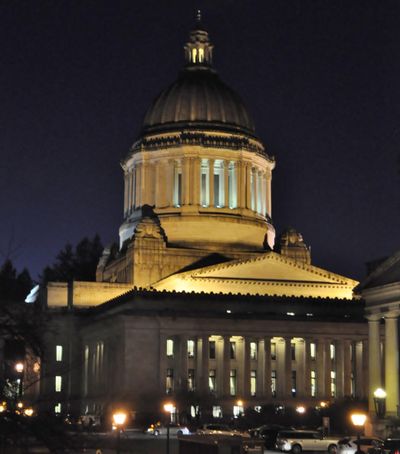Hundreds of bills alive in Washington Legislature, but many more missed deadline

OLYMPIA – There’s an excellent chance Washington driver’s licenses will change in the next year and that if those drivers are caught using smartphones for various things, they’ll be more likely to get a ticket.
There’s a pretty good chance that kids will be able to bring sunscreen to school and that the City of Spokane will get some help tracking abandoned homes. Ditto for proposals to amend the Growth Management Act to allow more school construction and to revise water laws to overcome a state Supreme Court ruling that has put a halt to some suburban and rural development.
There’s almost no chance the state will abolish the death penalty or require certain types of storage for firearms in a home, and only a slightly better chance it could require new school buses to have seat belts.
With the Legislature past the halfway mark of the 105-day regular session, committees for each chamber are busily reviewing bills that have passed the other chamber and still have a reasonable chance of becoming law this year.
At a Republican leadership press conference Monday, lawmakers said the House had passed and sent the Senate 376 bills by last week’s deadline; the Senate had passed and sent to the House 281 bills. While that may sound like quite a lot, it’s considerably fewer than the more than 1,150 that have been introduced in the House and more than 860 introduced in the Senate.
That deadline, known as a cutoff, required most bills that change a state policy to pass the chamber where they were introduced by last Thursday. Bills that are needed for the state’s two-year operating budget have more time.
Among the bills still alive
REAL ID driver’s licenses. The House and Senate each passed bills to bring Washington’s driver’s licenses into compliance with federal law. Unlike most states, Washington does not require proof of legal residence to receive a standard driver’s license. It does require that proof for a more expensive enhanced license. The two bills lower the cost of the enhanced license and require a notation on new standard licenses that they cannot be used at places that require federally compliant ID. That will include boarding a commercial airliner, starting next January.
Distracted driving. Both chambers also passed bills that expand penalties for using a cellphone while driving. Currently the law covers talking without a hands-free device or texting, but doesn’t cover many other things a driver might do with a smartphone, like checking the internet or using Facebook.
Sunscreen in schools. Current state law that restricts bringing pharmaceuticals to school can be interpreted to prohibit the use or possession of sunscreen, which is regulated by the Food and Drug Administration. The Senate passed a bill allowing students to bring and apply sunscreen, and for schools to apply it to smaller students if a parent or guardian supplies it. The bill received a hearing in the House Education Committee on Monday.
Foreclosed properties. The House and Senate both passed versions of a bill that is trying to clear up responsibility for foreclosed and abandoned properties and time limits on when lenders can enter the property after a borrower defaults on a loan. The city of Spokane is hoping that bill will allow it get help from lenders on setting up a registry of abandoned properties that will help first responders keep track of them and notify the responsible party if they need to be cleaned up. A lobbyist for the city said that language has the support of the different sides in the ongoing discussions, and if they reach an agreement on the main points of the bill, a section to help the city likely will be added.
School locations. As Washington requires fewer students in classrooms for kindergarten through third grade, it will need more classrooms. But some districts have had problems finding places with the proper zoning to build new schools, particularly in suburban or rural areas. A bipartisan House bill sponsored by Rep. Bob McCaslin, R-Spokane Valley, would keep the state’s Growth Management Act from barring a school district from building in a rural area if the county and affected cities agree. It passed the House last week and was sent to the Senate K-12 Education Committee.
Water rights. A state Supreme Court ruling, commonly known as the Hirst decision, has restricted the ability of property owners to drill wells to get water from an aquifer for development. In an effort to clarify state water law, the Senate passed a bill that expands the ability of local governments to approve developments using Department of Ecology water resources rules.
Probably not happening this year
Ending capital punishment. A bill to eliminate the death penalty in favor of life in prison without parole had support from Gov. Jay Inslee, Attorney General Bob Ferguson and a bipartisan group of legislators. The bill got a hearing in the House, but not in the Senate, and never came up for a vote.
Firearms access: The House Judiciary Committee approved a bill that would allow a person to be charged with reckless endangerment if they did not lock up a firearm and a child got access to that gun and hurt himself or someone else. It didn’t come up for a vote in the House.
School bus seat belts. The Senate Transportation Committee passed a requirement that new school buses bought after the start of this school year be equipped with seat belts and shoulder restraints. It didn’t get a hearing in the Ways and Means Committee and would have to be put in the budget as part of the overall school reform package.